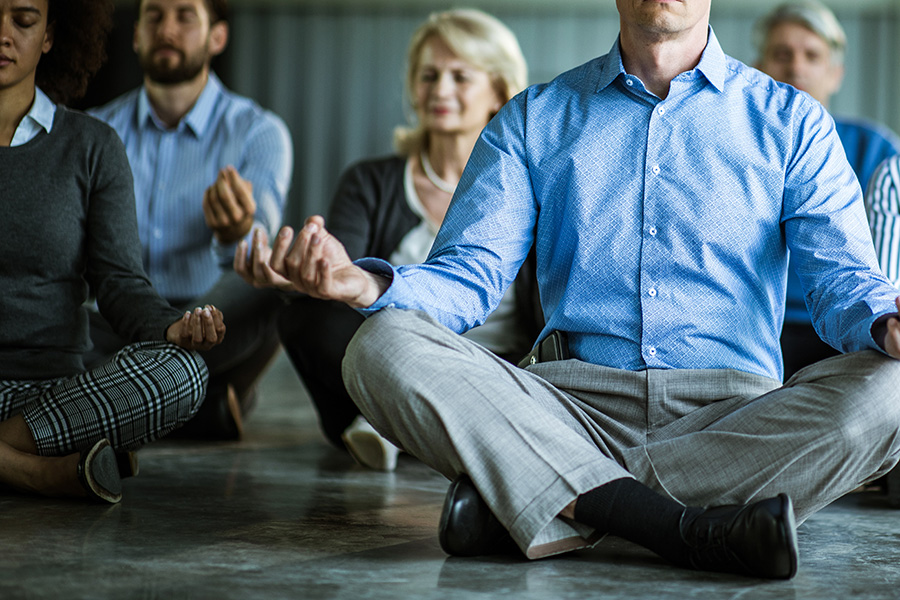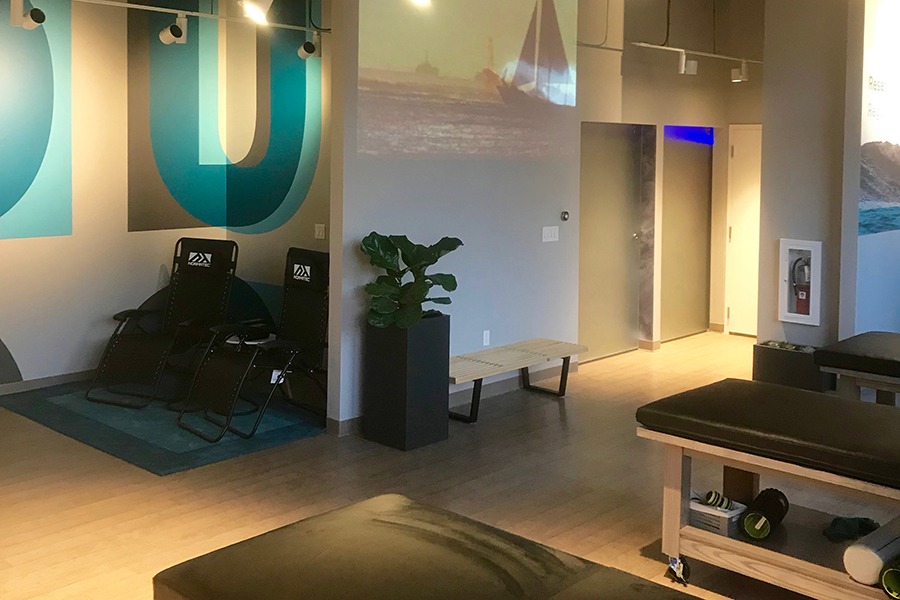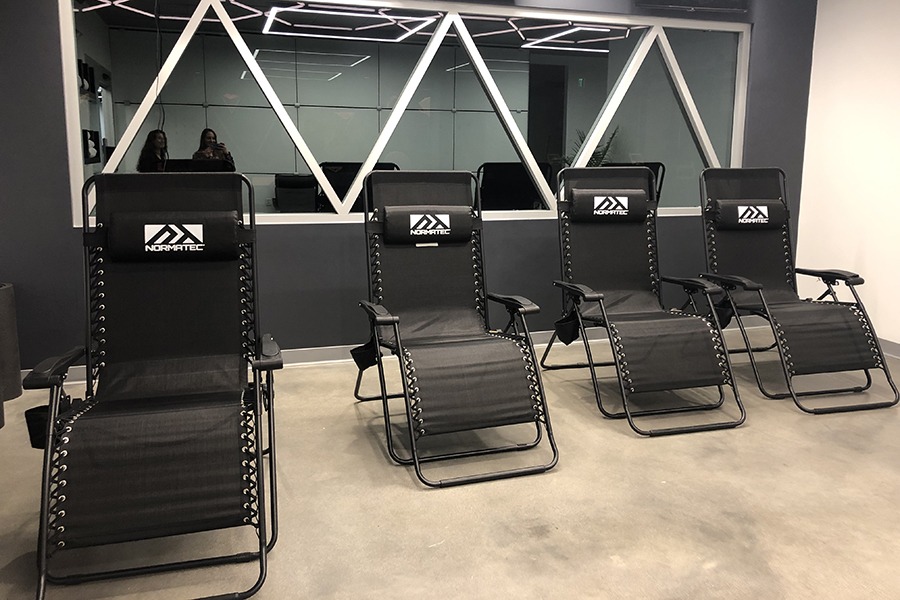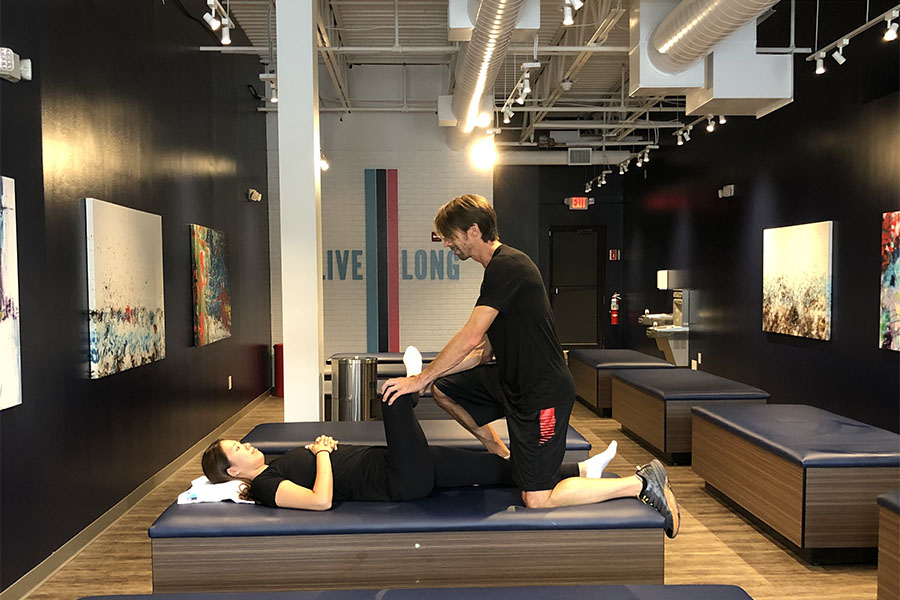As Everything in Your Life Speeds Up, the Wellness Industry Is Saying “Slow Down”
Recovery is the name of the game in 2020. Here's a closer look at the stretch studios, saunas, and home-grown recovery tools to hit Boston's fitness scene.

Photo via Getty Images
Finally, the next big trend in fitness isn’t pining for more. As every other aspect of our lives becomes a rat race of productivity, the fitness and wellness world has said enough is enough. We’re taking a step back. We’re settling for what already is and taking inventory of how far we’ve come to appreciate the bodies we’re in right now. It’s quite the breath of fresh air.
Like the juice cleanses that swept the nation from the west coast to the east coast, performance recovery, mindfulness, and meditation are all themes that haven’t just taken ahold of the scene—they’re becoming the scene.
“Most people are living at the edge of their capacity most days,” Amy Swift, co-founder of the stretch studio Bdy Sqd, tells me. “Their personal lives are full, their professional lives are full, and they are ambitious and want the most. The rise of recovery is a true reflection in the rise of expectations in productivity.”
Meditation studios are at every corner in L.A., napercise classes have landed in NYC, and here in the Hub we have stretch studios, Himalayan salt caves, and Hypervolt guns. Even Lebron James’ favorite way to recover—with NormaTec sleeves and boots, naturally—are homegrown right here.
Boston fitness pros predicted before 2020 began that recovery would be the biggest fitness trend of the year, but will it actually help us slow down and unwind, or will it just become another thing to check off our to-do list? I guess it depends on how you, the user, approach it. Like juice cleanses, athleisure, and spin before it, only time will tell if recovery has the legs to become a full movement—or whether it’s worth adding to your already packed fitness routine. Two things are for certain though: Boston is teeming with places to kick your feet up and industry experts range from intrigued to totally on board.

Stretch tables, where one-on-one assisted stretches take place, and NormaTec recliners at Bdy Sqd in the South End / Photo provided
At Bdy Sqd, where clients meet with stretch coaches for one-on-one stretches, Swift says the way they look at recovery is as a reset experience: “Self-care and managing stress has to happen no matter where you are, but something happens specifically when you walk into a room designed to make you feel better.” When you walk into Bdy Sqd, everything from the scent to the decals on the wall to the music are curated to help you decompress.

NormaTec recliners at the recovery room at BKBX where the space also features a cryotherapy tank and infrared sauna around the corner. / Photo by Tessa Yannone
And it’s a trend plenty of other studios around the Boston area are adopting. Brooklyn Boulders’ new gym experience in Allston, BKBX, has an entire room dedicated to Cryotherapy, infrared saunas, and NormaTec boots, while EverybodyFights in the Seaport just added their own version of a recovery room. A StretchLab graced Wellesley in December. Plus, even if gyms don’t have a dedicated room for rest and relaxation, they often have therapy tools, like Hypervolt guns or vibrating foam rollers for maximum pliability (thank you, Tom Brady and TB12).

Recliners, Hypervolt therapy guns, and mood lighting await fighters at EverybodyFights recovery room in the Seaport / Photo by Tessa Yannone
But if we were to look at the trend as a whole, it’s not anything new. Physical therapists have long been using modalities like these to help their patients. It’s just become more of a collective agreement that we’re all going to take a little more time to care for the body we seem to be grinding into the ground.
Vijay Daryanani, a physical therapist and 20-year clinician at Spaulding Rehabilitation Hospital in Charlestown, says it’s about empowerment. “We don’t want repeat patients,” he says. “I know that seems counterintuitive, but we want to give them the extra avenues to be able to take care of themselves.” He frequently uses ice compression machines, the TheraGun, and other technologically advanced therapy tools on his patients.
Others in the industry, though, are a little more skeptical. Stephanie Allen, a physical therapist at Boston Physical Therapy and Wellness, says she doesn’t want her patients to rely on these types of devices and she urges them to think about the intent. “If you’re using things like a foam roller for temporary pain relief, I see no harm in that,” she says. “But [the extra step] is not necessarily required to improve things like aerobic output or strength.” Allen is more in the camp of “movement is thy medicine” and if you’re moving well, and moving often, recovery doesn’t need to be as complicated (or nuanced) as some of these studios are making it out to be.
There is something to be said for what’s going on neurologically, though. Allen says that using these trendy recovery tools will elicit a nervous system change, where you might feel a decrease in tightness and be able to breathe more deeply into those areas.

A stretch session in action at Stretch Lab in Wellesley. / Photo provided
It’s fair to say that, as with diets and exercise regimens, the wellness world is throwing a lot of information at us all at once. It’s up to us to discern which tools to add to our toolbox and which ones to leave out. Because while it might be beneficial to carry around ten different wrenches at once, it becomes quite the hassle (and awfully heavy) when maybe only one will do the trick.
Be intentional about the things you add to your toolbox. Be consistent with what you’re using. And at the end of the day, it’s about stress management. If getting to a fancy stretch studio is stressing you out, nix it and don’t feel bad about it. Optimization doesn’t always need to be the name of the game. Sometimes just being present in the bodies that we are in is enough.
Join Boston Magazine and Be Well Boston on Tuesday, February 4 from 6 p.m.-9 p.m. at the Lenox Hotel for a panel discussion diving deeper into this topic. Expert panelists include yoga and meditation teacher Rebecca Pacheco, co-founder of Bdy Sqd Amy Swift, and co-owner and head clinician at Back Bay Health Tim Latham. All proceeds will support the non-profit Youth Enrichment Services to inspire and challenge youth with physical and mental activities. Get your tickets here!

